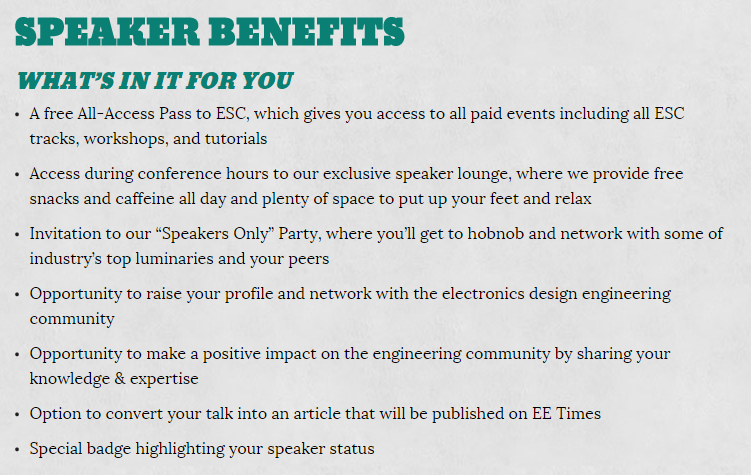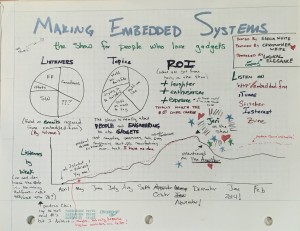I wanted to write you a letter to apologize that the Embedded Systems Conference (Silicon Valley) was a disappointing experience. I feel responsible as I mentioned it several times because I thought it would be interesting and educational, possibly even fun. I invited many to speak, attend, or even to show up for the free expo at event.
I expected these good things for you and me; I felt that we didn’t get them. I’m disappointed by the actuality for myself and guilty about the people I roped into going. I was a featured speaker and I’m sorry I was affiliated with them.
I’ve been going for years, even speaking for years: I thought I knew what I was getting us into. I knew it would be a little smaller but I didn’t expect such drastic changes to the format and organization. (And it was a lot smaller, not only a little smaller, than previous years.)
I know those of you who only went to the expo didn’t have to pay anything to attend but I’m well aware of the value of time. The expo hall was a waste of time to me. It wasn’t even really an expo with exhibitors but a demo hall with sponsors. It was tiny, lacking the expected big names (TI, Atmel, Microchip were all missing as were a hundred others who had been stalwarts of ESCs past). I can’t blame them, there were no booths, instead they had tiny one sided kiosks the size of bathroom stalls with narrow aisles in between.
There were no vendor classes, no space to chat without being jostled. The room was very loud and somewhat dim. It was a terrible place to have a conversation. I could get far more info from vendor websites than the displays that were smaller than science fair posters. Since I attend the expo for the conversations, the area was pointless for me. The few demos I saw were unintelligible. Walking around was difficult as a crowd of four tended to block traffic through the small aisles.
I tweeted, wrote, and said that one of my sessions would be on the expo floor as it was listed as being in the Fantastical Theater. However, it was over in the paid area (still free to attend but difficult to find, you had to go through the bar to get there). It turned out ok, I think you found us and I was glad to have been in that room. I went to a session on the expo floor (also inexplicably billed as being in the Fantastical Theater). Though the material was fine, the session occurred during the happy hour on the expo floor. The speaker was often unintelligible as people nearby networked, chatted, and clinked bottles. The speaker had more aplomb than I would have, even to continue his session.
If you paid to attend because I suggested it, I’m frustrated you didn’t get the experience I wanted and expected for you, the one you should have. I cannot imagine how they justified turning paying attendees away from sessions because their rooms were too small. There were only a few rooms for speakers so seating was a first-come, first-served, stand-at-the-back and sit-on-the-floor sort. While my speaker pass was all-access, supposedly one of my perks for speaking, I missed sessions rather than take someone else’s spot and still I feel awful that you missed out because of poor planning.
I had nothing to do with that and nothing to do with the strange layout that made it so you had to walk through the bar and restaurant four or five times a day. It was nice they had comfy seats there but inexplicable that talks, expo, restrooms, and lunch always seemed to require a hike through the bar.
Finally, if I had any part in you signing up to be a speaker, I am the most deeply sorry for that. The speaker room was tiny, poorly appointed. To get lunch, we had to hike (through the bar) to get an attendee lunch in the expo hall. There was a nice-ish buffet lunch outside the speaker room but it was for UBM management only. I resented that they provided so well for themselves so well when I felt speakers were so shoddily treated.
At every other ESC I’ve spoken at, speakers have received a good lunch and plenty of snacks in a large speaker room. With at least half a dozen tables, it was a fun place to hang out. This year, with such a small room (one table plus a ledge with chairs), it was not a place to hang out and chat (the centrally located bar was better for that).
Also, and I think this was new, the speaker room and the media room were the same room. As a speaker and as a media representative, I do not appreciate this. As a speaker, I want down time and to meet with other speakers. In my occasional role as media, I want quiet space to interview. (Note: I did not do any media at this event as I felt promoting it in any further way was a waste.)
One reason to speak at the conference was to get exposure. However, speaker names not in the printed program (though there was space). Even on other posters, it was talk name and company only, not the speaker (there was an exception for Max the Magnificent from Embedded.com). I found that annoying: another instance of the conference organizers being unappreciative of the time, energy, and expense that the speakers put into their presentations (and many of us were not there in company-sponsored session so all of this came from our own pocket).
Another reason to speak (see image), is the Speaker Party (‘Invitation to our “Speakers Only” Party, where you’ll get to hobnob and network with some of industry’s top luminaries and your peers’). That was not actually part of the organizers’ plan at all.
Instead, after I asked the organizers twice in the weeks leading up to the event (getting contradictory answers), I complained on the morning of the last day. At 3pm, the organizers sent out a party invite for 3:30pm, while there were still talks going on and after many speakers had left. I opted not to attend this, having reached the end of my patience with the organizers and the conference.
I feel most embarrassed because I feel like I should have known before the conference. There was a lot of disorganization in the emails leading up to the event. However, I did not know. This doesn’t excuse my promotion and involvement with such a pathetic, disorganized conference. I will try to do better in the future.




